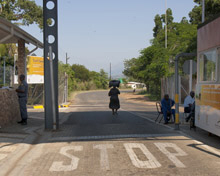
Typical street scene in Santa Ana, El Salvador. (Photo: iStock)
IMF Survey: Customs Revenue, Fiscal Steps Can Power Swaziland Recovery
February 10, 2012
- Fiscal crisis deepened in 2011 while economy weakened severely
- Expected higher customs revenue, upfront fiscal steps can ease immediate pressures
- Authorities should move forward with measures to improve business climate
After a fiscal crisis in 2011 that severely weakened the economy, Swaziland has an opportunity to move forward with structural reforms that will improve growth prospects.

Border post into South Africa from Matsamo, Swaziland: customs revenue boost would help finance early retirement program (photo: Arnold Drapkin/Newscom)
ECONOMIC HEALTH CHECK
In its regular review of the country’s economy, the IMF said upfront fiscal measures, together with external financing and higher customs revenue in 2012, would enable the government to clear its domestic arrears and restore fiscal sustainability.
In addition to adjusting the size of the budget, the quality of spending could be improved, with more resources allocated to education, the fight against HIV/AIDS, and social protection for orphaned and vulnerable children and the elderly.
The year 2011 was difficult for Swaziland’s economy. Economic activity stagnated, with real gross domestic product (GDP) growth estimated at ¼ percent. Output is likely to contract by 2 percent in 2012. Inflation accelerated to an annual rate of 7¾ percent in December 2011, due to higher food and fuel prices.
Because of a large fall in Southern African Customs Union revenue and uncontrolled expenditure, the fiscal deficit reached 13¾ percent of GDP for the fiscal year 2010/11 and is expected to remain high for 2011/12, at about 10 percent of GDP. The lack of financing led the government to accumulate large domestic arrears, and to reduce its cash balance at the central bank.
Following this reduction, Swaziland external position weakened with gross official reserves of the central bank representing 2¼ months of prospective import cover at end-December 2011 compared with 4 months of imports at end-2009.
Chance for budget turnaround
With expected customs revenue for 2012/13 of about 23½ percent of GDP, compared with 10 percent the previous year, the 2012/13 budget offers an opportunity to clear all accumulated arrears. The revenue boost would also help finance a voluntary early retirement program that is critical to reduce the wage bill and subsequently restore fiscal sustainability.
A fiscal surplus of E 900 million (3 percent of GDP) could be targeted in the 2012/13 budget. Such a surplus, combined with external financing, would allow a full clearance of arrears, projected to reach about E 2¾ billion (9½ percent of GDP) by the end of FY 2012.
This surplus could be achieved with an immediate and upfront saving on the wage bill of at least E 300 million (1 percent of GDP). Together with other savings in nonpoverty-alleviating spending, the budget could then cover the upfront cost of implementing the early retirement program.
Stronger public institutions
Swaziland’s government is committed to move forward with an ambitious reform agenda on public finance management, drawn up with assistance from the IMF and other development partners. Significant technical and financial assistance will be available to support the government’s implementation of the reform agenda, once it is approved by the cabinet. Key priorities for 2012 include a revised public financial management bill, improving budget reporting, strengthening expenditure control, and enhancing budget preparation.
Continued efforts will also be needed on the revenue side, as the Swaziland Revenue Authority will need resources to successfully implement a value-added tax planned for 2012, and to strengthen further its large taxpayer unit.
The IMF recommends merging the Ministry of Finance, the Ministry of Economic Development and Planning, and the budget-related functions of the Ministry of Public Services into one ministry that would have sole authority over the budget process, including preparation, implementation and monitoring.
Better financial sector surveillance
The IMF advised the Central Bank of Swaziland to
• Examine the credit portfolio of commercial banks to ensure that there is no evergreening of problem loans
• Undertake an onsite inspection of one of the banks, and
• Update stress tests on a monthly basis to ensure that credit, concentration and liquidity risks do not intensify over the coming months.
The IMF also advised the central bank to monitor the deposit base, given its decline in recent months, and ensure an adequate response in the event of large deposit outflows. The authorities could move swiftly to make operational a new regulatory authority for nonbank financial institutions, and shift the supervision of savings and credit cooperatives to the central bank in the interim.
Enhancing growth prospects
The authorities should move forward with steps aimed at improving the business climate. For example, the last remaining state-owned bank could be privatized, while other markets, such as telecommunications, could be liberalized to allow free competition.
In particular, a second license on mobile telecommunications could be granted through a competitive tendering process. Such steps would not only improve growth prospects, but also bring additional resources to the budget.


